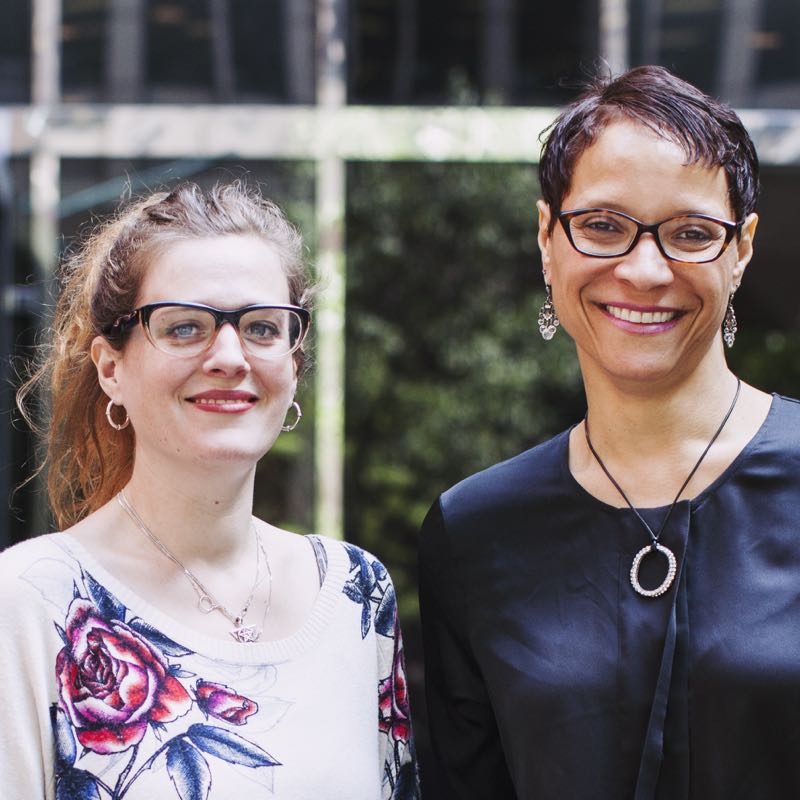Leah C. Gardiner and Penelope Skinner on The Ruins of Civilization
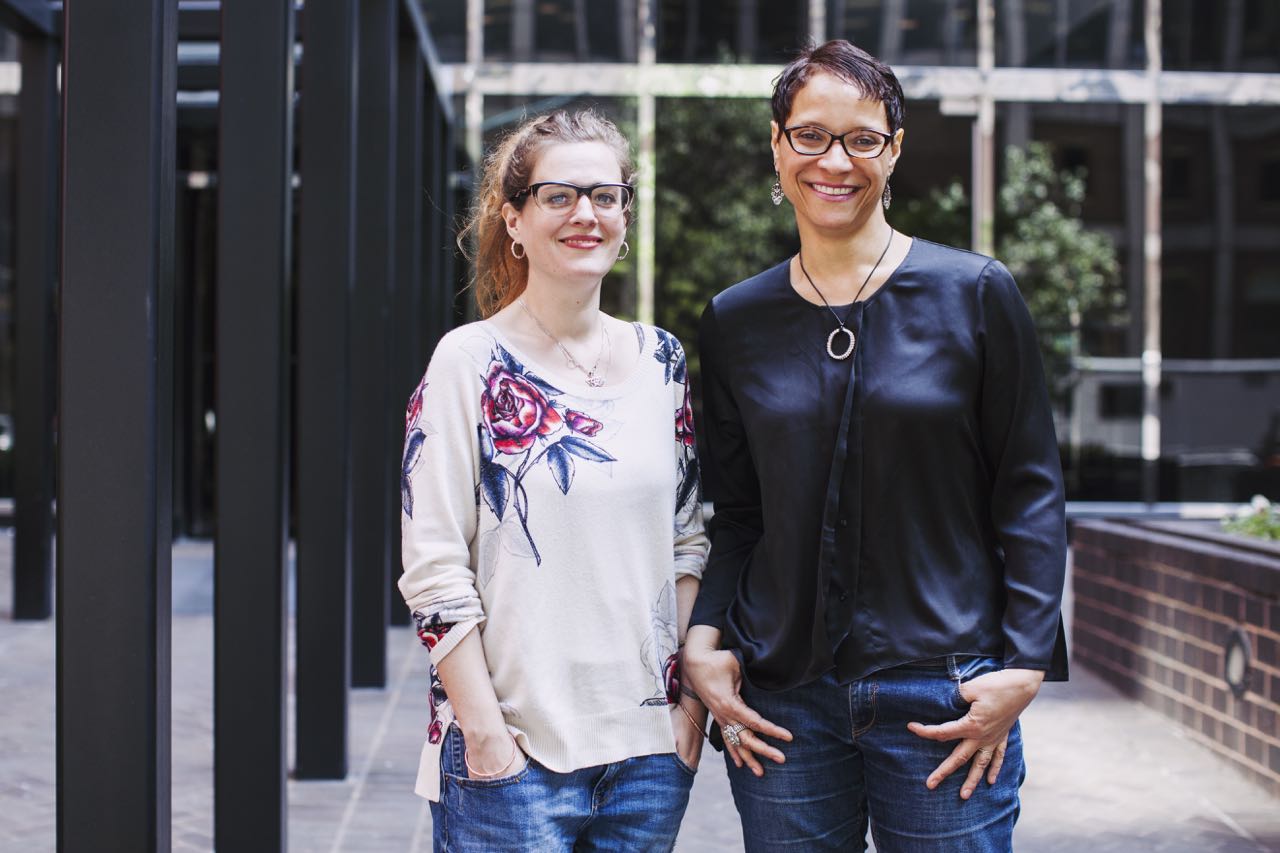
Written by Victoria Myers
Photography by Jacqueline Harriet
May 26th, 2016
The CW Upfronts are going on outside Manhattan Theatre Club’s space in City Center where The Ruins of Civilization opened the night before. The Ruins of Civilization imagines a not-so-distant future where the planet is on the verge of extinction and the United Kingdom, where the play is set, has closed its borders and restricted families wishing for state benefits to one child (and I suppose it’s safe to assume Gossip Girl is no longer considered the greatest television show of our time ). The new play, helmed by Leah C. Gardiner, marks the first New York premiere for British playwright Penelope Skinner. It also is the only play written by a woman to grace MTC’s stages this season, which caused a minor social media uproar last summer—a fact only germane to this interview insofar as I was quoted in an article about it. Leah and Penelope sat down to talk about the tone of the show, cultural differences, the issues that inspired the play, and more.
Last night was opening night of The Ruins of Civilization. What’s it like actually being inside that if you’re the director and writer when it’s your work on display?
Leah: I think for me, as the director, it’s really exciting to be able to actually watch the play for the first time without looking at what the actors are doing or what’s working technically, or not working, and just seeing the production as a whole. I find it’s really exhilarating because I can actually see what I’ve created. Whereas before, you’re in it all the time—you can’t really appreciate the art, the complete painting of it all. Then, when you come out of that experience and you’re met with such accolades, it’s joyful. Scary at the same time, because you’re invited into someone’s home and you want to do a good job and you want to be polite, you want to mind your manners and all those things that you do when you’re invited into someone’s home. So when you can deliver a fine product you feel really good about it. At least I do.
Penelope: You do it differently here. We do press and opening the same night. For me, it was nice because the audience was very supportive and there was nobody there to criticize. As a result [of the pressure being off], I felt like they did a really good show, and that’s nice. We leave it behind now, so for us to leave it on that kind of good feeling is… there are things about this way around that are more stressful, but this way around is good.
Can you talk about the parts that are more stressful doing it like this?
Penelope: What’s stressful is that people are going to read the reviews while you’re at the party, that’s stressful. Even though they all tell you that they’re not going to, you know that they are going to.
Leah: People start coming up to you and hugging you and grabbing you and kissing you and thanking you and you’re sort of like, “Oh, it must have gotten a great review.”
Penelope: What would it be like if it had gone the other way?
Leah: Everyone says, “Good night! Have a great night. Congratulations.”
Penelope: So that’s pretty stressful.
I’m curious to know about your working relationship. You didn’t know each other before this, yes?
Leah: We met through Skype.
What is that like paired together? What’s the process like for working together and putting the play up?
Penelope: Slightly different, because we were in different countries. I think we probably would have talked more [before rehearsals started] had we been in the same city. We threw ourselves into the deep end at the beginning of rehearsals. Other than that, pretty much the same as it would always be.
Leah: I was given the play, I was asked to interview. I went into the interview, spoke about the play, and they wanted me to meet with Penny. We spoke for a couple of hours through Skype. We both have a love for dogs, so that helped. Penny’s dog was just recovering from an operation. My dog happened to come and jump on my lap while I was on Skype with her. We just chatted about the play, somewhat. Then we did a bit of conversing back and forth through email, just about ideas and thoughts. She was shooting a film that she had written and directed. I was directing something else and we would catch up with each other when we could. Yes, since the first day, the play never had a reading, never had a workshop, we didn’t have a lot of time together, so it really was being thrown into the deep end together.
Did you find that that could actually be helpful? In interviews, we talk about new play development a lot, and one of the things I hear writers say is that there are too many readings, too many workshops. Were there any pluses to just doing it?
Penelope: I personally think however many workshops or readings you had, you will always go through a process of discovery and renewal when you’re in production, because there’s nothing like having an actor who is dedicated to that part and a director who is dedicated to that play working on the thing every day, knowing you’re going to have a production. I don’t think it’s that different, for me, anyway. For me, I always go in expecting to work on the play. That is what happened. I think there’s a difference between workshopping knowing that you’re going to have a production and workshopping not knowing. This play, I guess, had the gift of knowing it had a production, and you can’t compete with that really. As a thing, that’s the best thing.
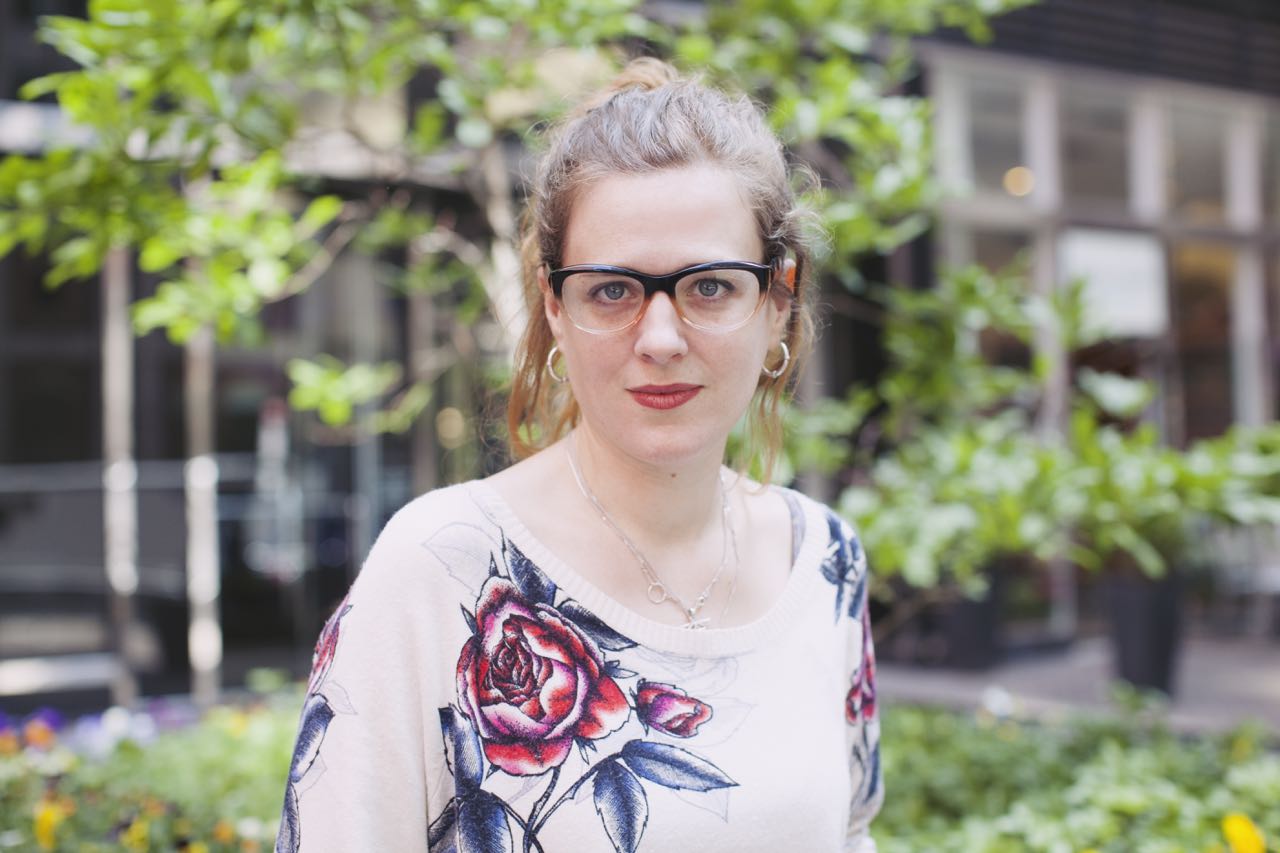
I wanted to talk about the tone of the piece. I think tone is always tricky, but particularly for something like this. How did you approach that, both in the writing and then in terms of having it work on stage?
Penelope: We talked about it a lot.
Leah: Yeah, we really did. I think one of things too, is Penny was finding it and tried to figure it out as we went. Then we had a press and marketing meeting with MTC and I saw that they were marketing it as a thriller. I thought, “Oh, boy. We’re going to have to figure that out.” They were very kind like, “Oh, don’t worry, it’s just marketing. It’s a way to sell it.” But of course, as the artist, again, you want to make sure that you deliver the product. I talked to Penny a bit about it and she’s like, “It’s also something else, and it’s something deeper.” We really excavated, we started there and started excavating. Thought and process. I think our first preview we had several different tones going, but we knew it going in. Then Lynne [Meadow, Artistic Director of MTC] kindly came and she said, “So, listen.”
Penelope: It’s hard because it’s set in a different time. We were going for a period-ish look, and it’s also in terms of make things happen. All those things—the tone is the main thing that ties all those things together in the end. I feel like we got there.
Leah: I agree. I so feel that way. I think it’s very strong.
There’s a lot of theatrical metaphor in this piece. Did that take, like you were saying, some real shaping in rehearsal?
Leah: Yeah, it requires a brevity and courage amongst the cast because you’re trying things out as you go, and Penny and I are both unrelenting. I think rightly so—you really want to create the best work possible. We would try different things out. Maybe after probably the third preview I would say we started really discovering, “You can say this line quite plainly, and if you just say the line you’ll get the laugh,” versus saying the line for the laugh. There was a lot of that tweaking that went on throughout the process. Because the play is dealing with such grand worldly issues, I think it’s easy to want to announce that this moment requires this kind of thought, whereas just playing the thought will allow the audience to receive it in the way that it should be announced.
Did you find there’s any difference in terms of how an American might perceive something versus how a British audience might?
Penelope: Many conversations. We’re very different. The main thing you have to do is persuade American actors to be less demonstrative emotionally because that’s probably the main difference. Particularly, a couple is an interesting example, that they were forever touching each other, and we had to be like, “Stop touching, you’re not touching each other in this moment.” That kind of thing. Things that feel very natural in your culture that just aren’t written. There are moments where they have to be not touching in order for the dialogue to make sense. They’re still trying to achieve something. In our culture if you’re touching it’s because you’ve made up, for example. You wouldn’t be touching and arguing at the same time, whereas maybe that is different here. Just so many things like that.
Do you also find differences like that in terms of dealing with the wider cultural implications of the piece?
Penelope: Yeah, you have to do a little bit of translating, I think. Knowing that it’s going to an American audience. That’s why having an American director is very helpful in that, so that I’m not going into it blind or discovering those things. I think we discovered most of those things before we went into previews so we weren’t going, “Why don’t they understand the details of the stipend,” or all of that.
Leah: I had to also know a lot about her culture, so that helped too. I could really help translate.
Did you have to give a lot of thought to cultural difference in terms of the psychology of the characters? In America we tend to be more removed from world events. For example, with the refugee crisis going on now, it’s very different in Europe than here.
Leah: We talked a lot about that, especially with the actors. One of our actors is actually very connected to the crisis. She was able to offer a lot of insight and thought. We did a lot of research for the actors just to help ground them in what it’s like in Europe and what “border” means there. What a wall going up there would mean, versus here. We just don’t have the kind of influx. Our dear President was allowing 10,000 in [a year], whereas they are dealing with 10,000 a day in some countries. It’s very different, just for them to grasp the size, the magnitude of the problem. They got it, at the end of the day, they really understood.
Penelope, when you get an idea for a play, are you one of those writers where you get an idea and sit down and you write a really quick first draft? Or do you mull it over for a long time and it’s a slow journey?
Penelope: It depends on the play. In the case of this play it was quite quick. Or at least the story in my head was quick, and then the writing of it was relatively straightforward. Sometimes it’s that way and sometimes it’s the other way. Sometimes it just ekes out for years. Depends on the play, I think.
Leah, when you get a script, do you tend to look for projects where you immediately go, “I can see this, I know how to do this.” Or do you look for projects where you think, “I have no idea how to do this, but I like it”?
Leah: It depends on the play, truthfully. If I’m challenged by the piece, then I tend to want to do it. In this case I was excited and challenged by it, because there were parts of it that I clearly connected to and understood and parts of it that seemed—initially on first read—that seemed interesting and I wasn’t quite sure why. Then when I read it again for the second time, before I interviewed for it, I really started seeing it, and I could imagine. A lot of times what happens for me is I see colors first, and then images are very three dimensional. I saw the set [for this play] instantly. I couldn’t find the right pictures, actually. I kept saying to Penny, “I can see it, I just can’t find the pictures.”
Penelope: We had an early conversation as well, I remember, where Leah said that she saw it as if this version of the future would be the future, but also something about their relationship being quite retro, so that there’s a something retro about their house. I thought that was a really amazing way to look at it, that it was period basically, even though you think of that as genre as low [brow]. In this case, we tried to think of it as more that we’re doing a period piece that just happens to be set in the future rather than the past. We tried to see it like that.
Leah: Yesterday it made me think of a person in my building. He has a one year old and he was so excited he said, “I can’t believe I’m reading books to her that I read as a child.” I said, “Yeah, it’s like wearing bell bottoms all over again, isn’t it?” That’s really what it is, right? Somehow, we in our future regurgitate our past and, I think, it’s because humanistically our past defines our future, and we don’t quite understand what that means. But if you see it in fashion it’s so clear. It’s very clear also in politics. This play has a lovely political tone to it.
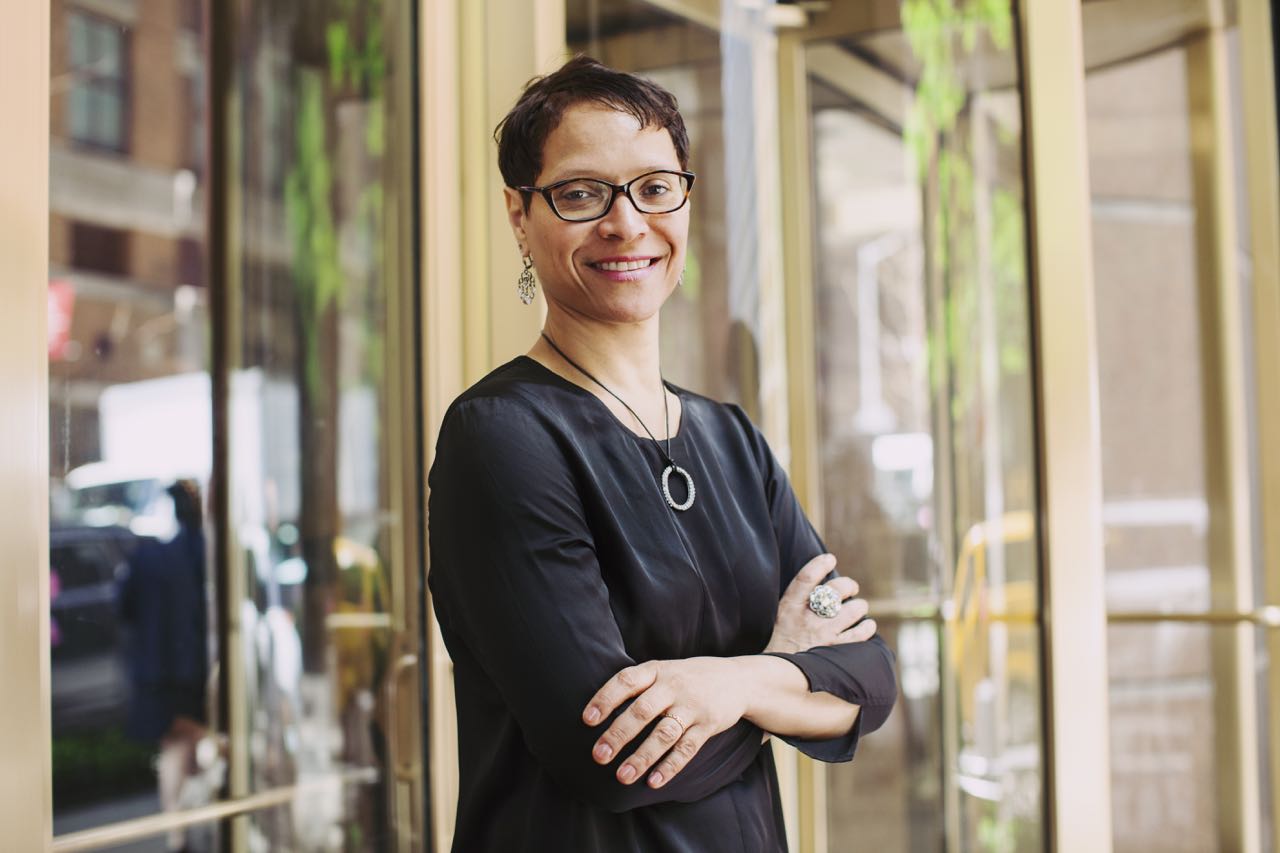
We’ve had some writers who will talk about how they hear the rhythm of the dialogue and understand the play musically. We’ve had some talk about how they create soundtracks in their mind for the show they’re writing. Do you do anything like that?
Penelope: Yeah, I do those things, certainly. I think one of the things that was great about watching this show last night, because I hadn’t seen it the last number of previews, is that they are comfortable now, those rhythms are starting to really… you can hear them. That’s very pleasing when it gets to that point. They’re playing, aren’t they? They’re playing the play. That’s really good.
I wanted to go back to something you touched on before, which is rewriting during rehearsal. I actually don’t think anybody has ever talked about that, but it seems like such a huge part of the process that I’d be interested to know how that works. Can you talk a little bit more about the process of rewriting during rehearsals?
Penelope: It’s a load of feedback and questioning. We sit and question the scenes and what is happening in this moment—all those things feed the rewriting process. It’s kind of scary isn’t it? Scary for everyone. Probably least scary for me and more scary for these guys because they’re getting new things, and suddenly a play which people have had and worked on is changing. It’s necessary.
Leah: I think it’s a contract, isn’t it,as a theater artist, that you have working on a new play that you make. Once you sign your actual contract, the contract says, I will do whatever I need to do in order to support the writer, to do the best work, to put it up on its feet. If we write and write and rewrite until the last day, then we do so. In our case, we did. I think on our final day, one or two lines were changed. By then, the actors are completely gung-ho because they know they’re well on their way now and they’re ready to fly.
Do you have a process for filtering or figuring out what notes and what parts of feedback to listen to or not listen to? Or when to wait and be like, “Okay, let’s try it another performance,” or, “Let’s change it now”?
Leah: There were dual decisions. Penny would say, “I need to see this now,” so we would work on that particular scene or scenes at that moment. Or she would say, “I can’t really deal with that scene until I see the rest of the play.” It’s my job—and my duty, I believe—to facilitate the room, so that how she needs to envision is made clear as she’s creating and as she’s writing. We would do whatever she needed.
Penelope: There comes a point where the actors have got to learn their lines. Maybe there’s a hiatus where you do a lot of rewriting early on, and then there’s this hiatus where they’ve just got to learn their lines, then you can go back to changing things again because they essentially know their lines. I think that it’s scary, but it’s always the way. You always get there in the end. By the end, it’s always pretty much the thing you wanted it to be. I think we did the most dramatic changes we changed during rehearsal and that’s because Leah was able to facilitate that. That’s great, that’s what you want. You don’t want to be making those big changes during previews, really. People do it. If it has to happen, it has to happen.
I’ve noticed that British writers are slightly more interested in writing political plays than Americans are. Or at least they have a different way of doing it, which I think in part comes from a different theatre history. In the UK there were censorship laws, but we had McCarthyism, and that changed how political issues were handled on stage. It has also been said that women here are less likely to write about political issues. Do you feel that your work is talked about differently because you’re a female playwright writing about a political issue?
Penelope: I remember somebody once said to me, “One day, maybe you’ll write a play that is about more than just women.” That really stayed with me, because I thought what a crazy thing to say. I feel like to some people women and politics are two separate things. I guess to me all theatre is political, whether it’s about politics or not.
Leah: That’s great. Theatre is a political act.
Penelope: Especially for women probably. It’s like, why don’t women decide to become directors or writers as often? I think to have your voice out there or your vision out there, there’s an idea that we’re less likely to do that.
Leah: I remember when I was in college, I met with an uncle who was a television writer. I said to him, “I want to become a theatre director.” He said, “Don’t do it.” I said, “Why?” He laughed. He said, “You’re a woman.” That was all I needed. “Oh thank you so much.” It’s a political act in every sense of the word.
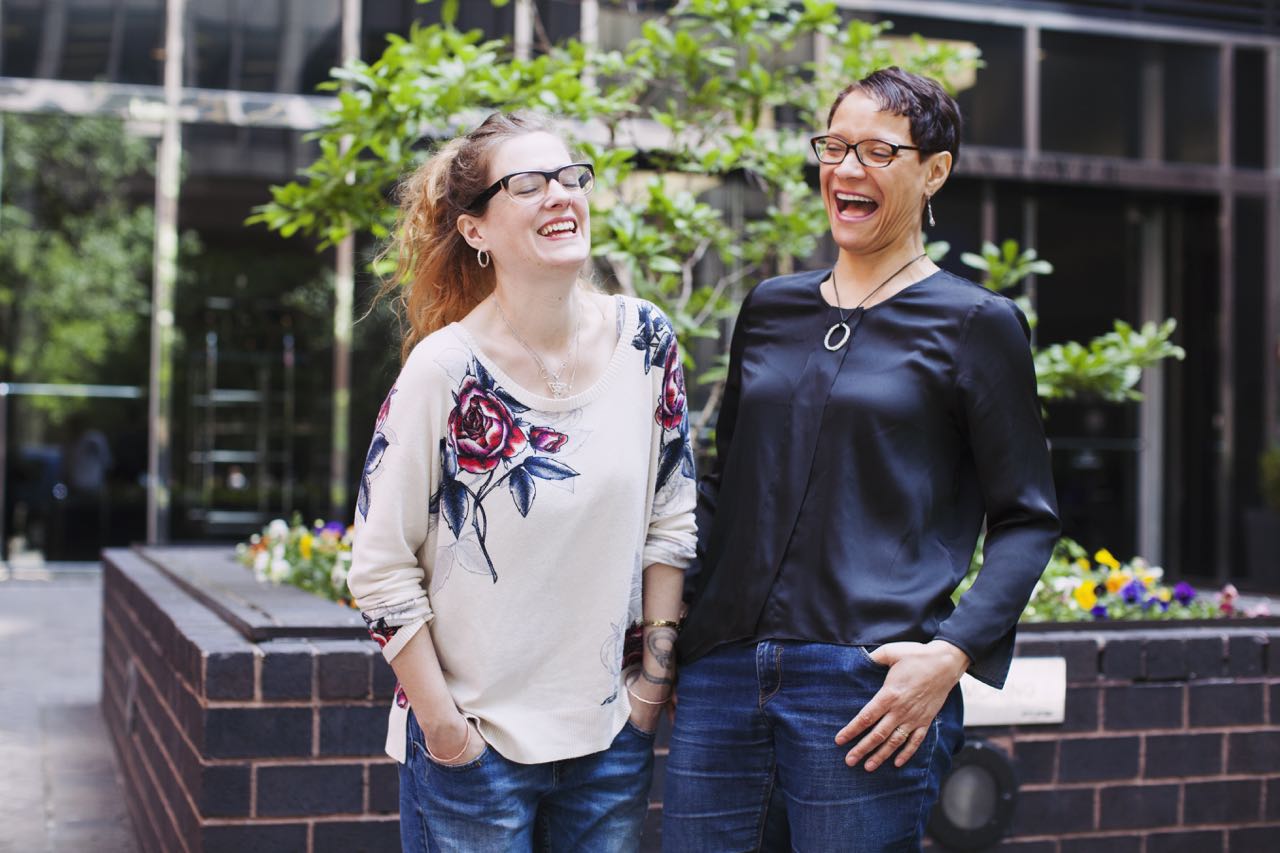
I want to talk a little bit more about the future aspect of the play and the metaphoric aspect of it. Recently, I read an article about someone who writes about zombies and how it’s all because of the personal anxieties that he feels and the anxiety that’s being felt culturally. How do you channel that? Where did your inspiration for the play come from?
Penelope: We are doomed. That’s the inspiration for the play. I did a lot of research for another play actually, which I never got to use in the writing of that other play. A lot of it was finding out what the reality is, the situation that we’re in. On day one, we went into it, and everyone was like [sighs].
Leah: It was devastating. They learned how quickly we can destroy the earth, if we’re not careful. There was one point, maybe our third week into rehearsal, when that little island off of Louisiana that was originally inhabited by Native Americans—it’s completely under water now. It just happened during the rehearsal process, and it’s our country. This is real, what’s happening. The environment is not something that people are really paying attention to. I think Al Gore worked very hard, after he left the vice presidency, and continues to do so, in this country. As an example, there are many, many activists, but not enough for us to pay attention, sadly. I think that there’s more of an awareness in Europe as an entity because Europeans and Brits tend to think more deeply about the world around them because they have to. They’re surrounded by so many different countries, they’ve been invaded, they know what it’s like to maintain superpower. I think it’s very different here for us, only two other countries surrounding us. Threat is not as real because threat is not real politically, it’s not real environmentally. I think that’s a concern.
How did you balance the personal relationships in the play and the fact that it’s a play, it’s about people, and they go on a journey, with the bigger themes?
Penelope: In the story of the play, those things are directly affecting their personal lives. It’s like the next phase of us. They’re in the next phase of trying to ignore it. We’re like phase one of ignoring it at the moment, in the West. We’re still able to go, “Ahhh, it’s not happening.” This is taking place at a time when that’s become impossible, but they’re onto the next phase of going, “Ahh, it’s not happening.” They’re just doing it in a different way.
Leah: I would agree. I think the exciting thing about the play is that class is used in a very clever way, especially for us [Americans], because it’s not something that we necessarily indulge in and think about. She’s very clever in how she uses their particular class to go, “Ahh, I’m not going to think about it.”
And maybe even make it easier for the audience because there’s a distance, because the British class system is very different than ours.
Leah: It’s so prevalent and so different. It’s something, strangely enough, we admire. This crazy sense, “We love the monarchy!” Why? You know what I mean? “King George, he’s our guy!” It’s fascinating.
Penelope: They’ve done this great thing on the money tin [a prop in the play]. In the money tin, on the money, I don’t think you can see it from the audience but I found it backstage one day, and they’ve put William’s head on all of the money. So pleasing. I want one of those at the end: a five pound note with William’s head on it.

